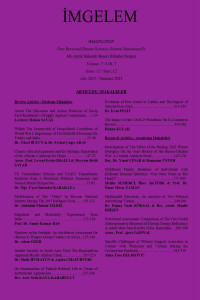US TRANSATLANTIC POLICIES AND US-EU TRANSATLANTIC RELATIONS FROM A HISTORICAL, POLITICAL, ECONOMIC AND SOCIO-CULTURAL PERSPECTIVE
Abstract
"Relations between the United States and Europe have evolved over centuries, encompassing political, economic, security, and socio-cultural dimensions within their multi-layered processes. The historical dimension of these relations, which began with the discovery of the American continent by Europeans and the establishment of colonies by the British, French, and Dutch in North America, gained significance after the American Revolutionary War from 1775 to 1783, when Europeans lost their influence in North America and the United States was founded. This process is commonly referred to as Europe-US relations or "Transatlantic Relations" (Transatlantic relations). This comprehensive set of relations has endured to the present, involving both bilateral relations between the US and European allies and the relations among international and supranational organizations established by these allies. Throughout history, these transatlantic relations can be divided into distinct periods such as the balance of power era in 19th-century Europe, World War I (1914-1918), the Interwar Period (1919-1939), World War II (1939-1945), the Cold War era (1945-1991), and the post-Cold War era. These historical periods have witnessed periods of conflict as well as cooperation among transatlantic partners, and have persisted to the present day. This study suggests that the transatlantic relations of the US encompass a historical process and that, after World War II, they have been shaped by US interests. However, these relations have also been influenced by the personal attitudes and doctrines of US presidents, as well as political, economic, and socio-cultural developments. Nonetheless, the current state of transatlantic relations reflects mutual interdependence, solidarity, alliance, and cooperation, with the overcoming of challenges. This study examines the historical process, events, and developments, and analyzes bilateral relations in their historical, political, economic, and socio-cultural dimensions."
References
- Aggestam, L., Hyde-Prive, A. (2019). Double Trouble: Trump, Transatlantic Relations and Eurpean Strategic Autonomy, Journal of Common Market Studies, 57, 114-127.
- Akçay, B., Göçmen, İ. (2012). Avrupa Birliği: Tarihçe, Teoriler, Kurumlar ve Politikalar, Ankara: Seçkin Yayınları.
- Akçay, E. Y. (2017). Barack Obama Dönemi Avrupa Birliği – ABD İlişkileri, Manas Sosyal Araştırmalar Dergisi, 6 (4), 713-731
US TRANSATLANTIC POLICIES AND US-EU TRANSATLANTIC RELATIONS FROM A HISTORICAL, POLITICAL, ECONOMIC AND SOCIO-CULTURAL PERSPECTIVE
Abstract
"Relations between the United States and Europe have evolved over centuries, encompassing political, economic, security, and socio-cultural dimensions within their multi-layered processes. The historical dimension of these relations, which began with the discovery of the American continent by Europeans and the establishment of colonies by the British, French, and Dutch in North America, gained significance after the American Revolutionary War from 1775 to 1783, when Europeans lost their influence in North America and the United States was founded. This process is commonly referred to as Europe-US relations or "Transatlantic Relations" (Transatlantic relations). This comprehensive set of relations has endured to the present, involving both bilateral relations between the US and European allies and the relations among international and supranational organizations established by these allies. Throughout history, these transatlantic relations can be divided into distinct periods such as the balance of power era in 19th-century Europe, World War I (1914-1918), the Interwar Period (1919-1939), World War II (1939-1945), the Cold War era (1945-1991), and the post-Cold War era. These historical periods have witnessed periods of conflict as well as cooperation among transatlantic partners, and have persisted to the present day. This study suggests that the transatlantic relations of the US encompass a historical process and that, after World War II, they have been shaped by US interests. However, these relations have also been influenced by the personal attitudes and doctrines of US presidents, as well as political, economic, and socio-cultural developments. Nonetheless, the current state of transatlantic relations reflects mutual interdependence, solidarity, alliance, and cooperation, with the overcoming of challenges. This study examines the historical process, events, and developments, and analyzes bilateral relations in their historical, political, economic, and socio-cultural dimensions."
Keywords
References
- Aggestam, L., Hyde-Prive, A. (2019). Double Trouble: Trump, Transatlantic Relations and Eurpean Strategic Autonomy, Journal of Common Market Studies, 57, 114-127.
- Akçay, B., Göçmen, İ. (2012). Avrupa Birliği: Tarihçe, Teoriler, Kurumlar ve Politikalar, Ankara: Seçkin Yayınları.
- Akçay, E. Y. (2017). Barack Obama Dönemi Avrupa Birliği – ABD İlişkileri, Manas Sosyal Araştırmalar Dergisi, 6 (4), 713-731
Details
| Primary Language | English |
|---|---|
| Subjects | International Politics |
| Journal Section | Articles |
| Authors | |
| Publication Date | July 30, 2023 |
| Submission Date | June 12, 2023 |
| Acceptance Date | June 20, 2023 |
| Published in Issue | Year 2023 Volume: 7 Issue: 12 |

This work licensed under a Creative Commons Attribution-NonCommercial 4.0 International License.
Please click here to contact the publisher.


